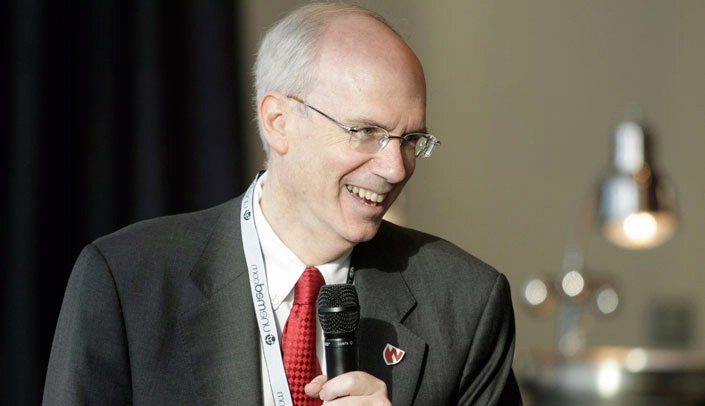UNeMed Corporation, the technology transfer office for UNMC, concluded another successful fiscal year with its annual shareholder meeting this month at TD Ameritrade Park.
The meeting brought together key UNMC leadership and researchers who mixed and mingled while learning about UNeMed’s efforts over the previous year and future initiatives.
During a brief set of remarks, UNMC Chancellor Jeffrey P. Gold, M.D., touched on UNMC’s record-breaking strides in research funding. UNMC’s annual research goal had long-been $100 million, a number eclipsed last year by more than $15 million.
“That was really a dramatic achievement,” Dr. Gold said, “but what is even more dramatic is . . . the percentage growth that we had was sixth-highest among academic medical centers in the United States.”
UNMC’s high-water mark for research could translate into more discoveries and innovations, said UNeMed President and CEO Michael Dixon, Ph.D..
A similar spike in research funding occurred in 2012. That same year, UNMC researchers reported a record 106 new inventions. The surge has largely been attributed to the 2009 federal stimulus package, the American Recovery and Reinvestment Act. Over the course of five years, the stimulus pumped more than $15 billion nationally into scientific facilities, research and instrumentation.
The more recent growth in research creates room for optimism, Dr. Dixon said.
UNeMed also reported a record 153 opportunities created in 2016, a 59 percent increase. Those opportunities led to 20 licensing agreements. “We’re asking companies to spend hundreds of millions, if not a billion dollars, on a single technology,” Dr. Dixon said, “so it takes time to develop those into products.”
Developing UNMC innovations was among four stated initiatives in the coming year, a task helped by recent growth in Nebraska’s biotechnology and startup sectors.
Recently, UNeMed has helped secure more than $2 million in additional funding for UNMC innovations through the University’s proof-of-concept grant program. Funded by the Nebraska Research Initiative, those grants have helped build three startup companies; attracted additional grant funding through other federal programs; and led to several industrial partnerships, Dixon said.
UNeMed’s remaining initiatives include continued focus on educational measures, a more robust internal communications program, and continued involvement in the startup and entrepreneurial communities.
“I can’t tell you how I’m reminded every single day of how great an organization this is,” Dr. Gold said, “and how much future potential we have. We already still phenomenal, but the best still lies ahead.”
